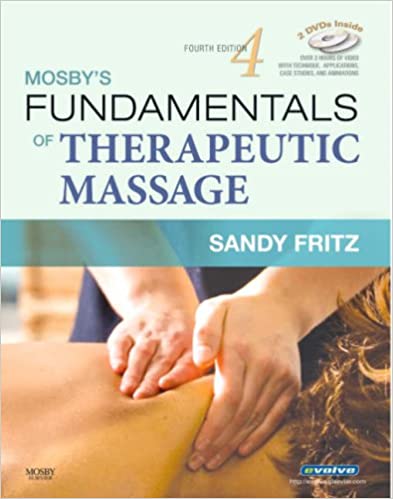In Stock
Test Bank For Mosby’s Fundamentals of Therapeutic Massage 4th Ed By Fritz
Digital item No Waiting Time Instant DownloadISBN-10:0323048617 ISBN-13:978-0323048613
Original price was: $55.00.$15.00Current price is: $15.00.
Test Bank For Mosby’s Fundamentals of Therapeutic Massage 4th Ed By Fritz
Chapter 02: Ethics, Professionalism, and Legal IssuesFritz: Mosby’s Fundamentals of Therapeutic Massage, 6th EditionMULTIPLE CHOICE1. Sheena has been working with Traci, a 14-year-old girl. Traci reminds Sheena of herself at that age, and Sheena is finding it difficult to avoid wondering, between appointments, how Traci is doing and whether she is keeping up with her physical therapy. Sheena should be aware that she is struggling with:a.transference.b.countertransference.c.dual roles.d.mentoring.ANS: B DIF: 2 REF: 64 2. Ben used to work for Phil, a more experienced massage professional, who helped him master the profession. Ben has the contact information of all of Phil’s clients, and he also knows what Phil charges for his services. If Ben considers talking with these clients and offering his services at a lower rate, he will be wrestling with:a.ethical decision making regarding a client’s needs.b.issues about informed consent concerning a colleague and a client.c.ethical decision making regarding a mentor.d.a challenge concerning standards of therapeutic relationships. ANS: C DIF: 3 REF: 31 3. A “professional” is described as someone who has:a.a specialized body of knowledge.b.limited training.c.no need for legal recognition through certification or licensure.d.a job other than one of service. ANS: A DIF: 2 REF: 354. Erik works in an electronic appliance store demonstrating how a neck massager can relieve tension. Craig works in a health care environment with patients who have been referred to him by a physician. Janis works in a salon and is an expert in both reflexology and classical massage. According to general public perception, what is each person’s professional status?a.Janis is a therapist; Craig is a practitioner; and Erik is a technician.b.Craig is a therapist; Janis is a practitioner; and Erik is a technician.c.Erik is a practitioner; Craig is a technician; and Janis is a therapist.d.Janis is a technician; Craig is a therapist; and Erik is a practitioner. ANS: B DIF: 2 REF: 39 5. Which of the following are Asian approaches to bodywork?a.Amma, watsu, acupressure, and do-inb.Thai massage, Soma, Looyen, and shiatsuc.Tibetan point holding, Thai massage, and shiatsud.Hoshino, Reiki, and Lomi lomi ANS: A DIF: 2 REF: 40 6. Which of the following groupings are considered neuromuscular approaches?a.Proprioceptive neuromuscular facilitation, reflexology, and Bindegewebmassageb.Neuromuscular technique, Vodder technique, applied physiology, and Tragerc.Muscle energy techniques, strain/counterstrain, Hellerwork, and reflexologyd.Orthobionomy, trigger points, Trager, and myotherapy ANS: D DIF: 2 REF: 40 7. Polarity, therapeutic touch, Reiki, and zero balancing would be defined as fitting with which of the following?a.Energetic (biofield) approachb.Structural and postural integration approachc.Integrated approachd.Neuromuscular approach ANS: A DIF: 2 REF: 41 8. Scope of practice for massage therapy includes:a.sound, scientifically proven cures for certain specific ailments.b.therapeutic effects on the respiratory system.c.relief from sexual tension or malfunction.d.nutritional counseling. ANS: B DIF: 2 REF: 14 9. Which of the following accurately describes scope of practice for therapeutic massage?a.Wellness massage practitioners can work with sick or injured people without direct supervision by a physician, nurse, or physical therapist.b.A massage practitioner cannot work with dysfunctional and complex postural patterns.c.Trained practitioners of rehabilitative massage include massage therapists, physical therapists, and athletic trainers.d.A wellness massage technician’s level of skill and training can be compared to that of a licensed electrician. AN: C DIF: 3 REF: 46 | 47 10. A massage therapist is planning to consult an attorney to help him prove to a nonpaying client (1) that he was truthful; (2) that he did no harm and, in fact, prevented harm; and (3) that the treatment he gave outweighed any cost or burden. The three ethical principles focusing on are:a.respect, beneficence, and veracity.b.self-determination and autonomy, beneficence, and justice.c.veracity, nonmaleficence, and proportionality.d.client autonomy and self-determination, nonmaleficence, and beneficence.ANS: C DIF: 2 REF: 53

Reviews
There are no reviews yet.